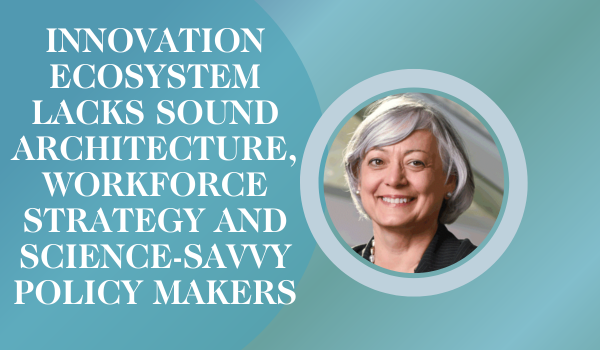Budget 2024 offers promising pledges for science, but falls short in a few ways
Guest ContributorMay 15, 2024
By Sara Laframboise and Farah Qaiser

Sarah Laframboise (right) is the executive director at Evidence for Democracy. Farah Qaiser (left) is the researcher at Evidence for Democracy. This op-ed first appeared here.
After three years of scattered investments, Budget 2024 offers some important wins for the Canadian science and research community, including the first increase in the value of graduate student scholarships and post-doctoral fellowships in over two decades.
But with every win, there are caveats, many questions to consider, and a pressing need for follow through.
Budget 2024 invests $825 million, over five years, to increase the value and number of graduate student scholarships and postdoctoral fellowships. This investment comes in the wake of a concerted advocacy effort, through groups such as Support Our Science and the Coalition for Canadian Research, and now places increased pressure on academic institutions to pay graduate students and postdoctoral fellows a living wage.
Secondly, Budget 2024 invests roughly $1.8 billion, over five years, into the core research grants funded through Canada’s federal granting agencies – that is, the grants which support independent researchers, generally affiliated with a post-secondary institution, to pursue ideas related to natural sciences, health research, social sciences, and the humanities.
This is a much-needed investment in the foundations of the research ecosystem, but only 12 per cent of this funding will be delivered in the coming year, leaving the bulk of this investment on the horizon, and very contingent on election outcomes.
Let’s be clear: these are important wins. Graduate students and postdoctoral fellows drive much of Canada’s research, discovery and innovation. By investing in this demographic, the Government of Canada is investing in the future of home-grown science and research.
But while significant, these investments fall short in a few ways. For example, the investment in scholarships and fellowships only benefits individuals who are fortunate enough to win a federal award – awards which have eligibility limitations, and don’t cover the increasing years that it now takes to secure a position as an independent researcher.
Additionally, while institutions and researchers will now be rightly pressured to match federal award values, they will continue to need more funds through core research grants to undergo this transition, and to keep up with inflation.
This can play out in a few ways: we may see an increase in the size of core research grants at the expense of declining success rates, or independent researchers will be forced to hire fewer graduate students and postdoctoral fellows at the expense of limiting opportunities for the next generation.
In the absence of broad increasers in core research grants, scholarships, and
fellowships, there is a risk of reinforcing the notion that only the financially privileged can pursue research, thereby limiting diversity within the research community.
Budget 2024 also lays out proposals to restructure the Canadian research ecosystem starting with the creation of a new “capstone research funding organization” acting as an umbrella to the existing federal granting agencies.
This new organization seems to be a version of the recommendations in the 2023 report from the Advisory Panel on the Federal Research Support System, and will largely house mission-driven and interdisciplinary research, both of which face significant challenges under the current system.
Budget 2024 also proposes the creation of a new Advisory Council on Science and Innovation consisting of the academic, industry, and non-profit sectors, to guide research priorities – including the establishment of a national science and innovation strategy.
This is critical: for Canada to fully leverage its knowledge assets and talent, we must lock eyes on a clear picture of where science is heading, and to what ends. We only hope that this proposed council has more success than the Council on Science and Innovation that was announced in January 2019, and unfortunately did not materialize.
While we have questions, we recognize that these investments represent a crucial step forward for Canadian science, and are a testament to a unified voice from the research community. (A rare feat in itself!)
Moving forward, it is vital that federal investments remain grounded in a long-term vision that prioritizes research as a cornerstone of our nation’s success and prosperity. This is what will ensure that Canadian science can continue to grow, sustainably, despite any changes in government leadership.
And, at the bare minimum, let’s ensure that we don’t have to endure another two decades for Canadian science to receive the support it deserves.
R$
Events For Leaders in
Science, Tech, Innovation, and Policy
Discuss and learn from those in the know at our virtual and in-person events.
See Upcoming Events
By using this website, you agree to our use of cookies. We use cookies to provide you with a great experience and to help our website run effectively in accordance with our Privacy Policy and Terms of Service.





